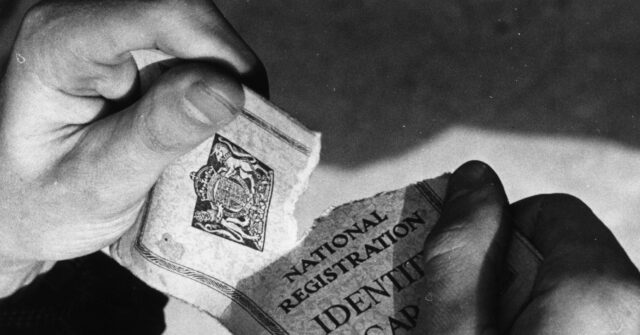A long-dead Tony Blair-era plan to Europeanise Britain by introducing mandatory ID cards has been resurrected by the UK’s left-wing government, which claims it is necessary to stop migrants crossing the English Channel on people smuggler boats.
The British government, which handles digital databases so competently it recently leaked a list of thousands of spies, diplomats, soldiers, and pro-Western Afghans to the Taliban, and rolled out a digitisation of the Post Office so bad it drove 13 people to commit suicide, now wants to build a national identity database of every adult living in the country.
Britons last had mandatory identity cards in the Second World War, when they were thought necessary to catch out German spies. But while most European countries have national mandatory identity documents, the United Kingdom abolished them after the war, figuring them to be fundamentally un-British and unnecessary. Even the left-wing Guardian stated in 1952 as identity cards were done away with: “In this country we do not like this sort of thing… The Labour party ought to know this characteristic of its countrymen by now, sad as it is for zealous planners to bear with”.
17 November 2004: A giant “ID” card bearing the Home Secretary David Blunkett’s face was set alight by protesters opposed to the Government’s compulsory identity card plans. Campaign group NO2ID burned the mock-up outside a central London venue where Mr Blunkett was due to outline further details of his multi-billion pound ID scheme. The group of about 20 protesters was also due to burn another card featuring Britain’s Prime Minister Tony Blair. (Photo by Stefan Rousseau – PA Images/PA Images via Getty Images)
But bringing the document back in a modernised form has long been a pet project of the left. Indeed, it was Britain’s Labour Party that delayed abolishing the wartime identity cards after the conflict ended by years.
The last left-wing government (1997-2010) had just started rolling the cards out by the end of its time on office in 2010, when it was replaced at the ballot box by a Conservative-Liberal coalition government, which made repealing the card law one of its first acts in power.
Per a report in The Daily Telegraph, the official announcement of the cards is expected from Prime Minister Sir Keir Starmer on Friday and is being pushed by the new Home Secretary, Shabana Mahmood. It states she said earlier this month: “my long-term personal political view has always been in favour of ID cards”.
The paper states the rollout of what the government called a “Brit Card” would be enforced by the government requiring anyone getting a job or trying to rent somewhere to live to present their identify documents.
Rights campaigners, picking up on the mood music from Westminster that a return to wartime mandatory identity checks was in the works, spoke out against this encroachment on liberty this week. Big Brother Watch said in a joint-letter on Wednesday with other groups including Liberty, medConfidential, and the Runnymede Trust that mandatory identity plans should be abandoned.
They said:
A mandatory digital ID scheme could be implemented in a way that is uniquely harmful to privacy, equality and civil liberties. It would require the population to surrender vast amounts of personal data to be amassed into population-wide databases which could be amalgamated, searched, and analysed to monitor, track, and profile individuals.
A database which joins up all of our government-held records and logs our interactions with the state would be a treasure trove for hackers and malign actors, leaving us vulnerable to catastrophic data security breaches. Citizens should not be forced to surrender their privacy, security and data rights in order to access basic services.
In addition, mandatory digital ID would fundamentally change the relationship between the population and the state by requiring frequent identity checks as we navigate our daily lives. Although the current digital ID proposals are being considered in the context of immigration, there is no guarantee that a future government would not make digital ID a requirement to access a range of public and private services.
This story is developing, more follows
Read the full article here


